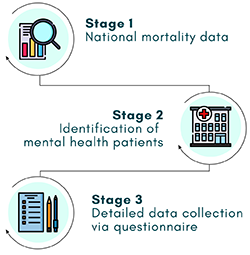
Resources
On this page:
- Reports
- Our toolkits
- Safer care for patients given a diagnosis of personality disorder: a learning resource
- Data slide sets and presentations
- NCISH publications
- NCISH methodology
- Sample questionnaires
- New standard of proof at inquest
- NCISH 10 standards for investigating serious incidents
- Data security and policy documents and related information
Reports
Download our reports, summaries and infographics of NCISH reports.
Our toolkits
Toolkit for safer services
Our toolkit presents quality and safety statements about clinical and organisational aspects of care, based on more than 20 years of research into patient safety. The toolkit is intended to be used as a basis for self-assessment by mental health care providers.
Download a PDF or Word version of our toolkit, which can be used to record progress.
Toolkit for self-harm
This toolkit has been developed by NCISH from the NICE Quality Standard for Self-Harm (QS34). Eight quality standards covering the initial management of self-harm and the provision of longer-term support for children and young people and adults who self-harm are presented in a format that is intended to be used as a basis for self-assessment by mental health care providers.
Download a PDF or Word version of our toolkit, which can be used to record progress.
Safer care for patients given a diagnosis of personality disorder: a learning resource
This online resource has been designed to help staff working in mental health services understand more about what it means to have been given a diagnosis of personality disorder and how to help people who present to services with this diagnosis.
Data slide sets and presentations
Download slide sets and presentations for teaching and local dissemination.
NCISH publications
View recent key publications written by our researchers and associated colleagues on over 20 years of research on patient safety across the UK.
NCISH methodology
Read a detailed description of how we collect data.
Sample questionnaires
You can download sample NCISH questionnaires. These provide a full list of the data we currently collect. You can also access our electronic suicide questionnaires.
New standard of proof at inquest
Read our BMJ editorial about the new standard of proof for suicide at inquests in England and Wales.
NCISH 10 standards for investigating serious incidents
NCISH has developed an abbreviated set of 10 principles of good practice for investigations conducted by NHS and independent sector mental health provider organisations following serious incidents. These standards are based on our recommendations from previous reviews of serious incidents and aided the development of the Royal College of Psychiatrists ‘Principles for full investigation of serious incidents’.
![]() Download an infographic of these 10 standards for investigating serious incidents.
Download an infographic of these 10 standards for investigating serious incidents.
![]() Download a visual representation of these 10 standards for investigating serious incidents.
Download a visual representation of these 10 standards for investigating serious incidents.
Data security and policy documents and related information
We make every effort to ensure our standards are high in handling sensitive data used in our important safety research.
Stakeholder survey
We value your opinion on our research, how we share our findings and how we could improve. This confidential survey takes a few minutes to complete and gives us your feedback on our research.
Frequently asked questions
We have a list of frequently asked questions about the NCISH methodology.
Requests for information
We publish our responses to your requests for information on the data we hold.

